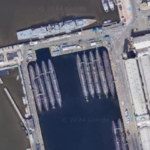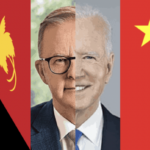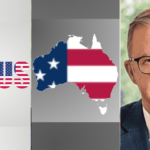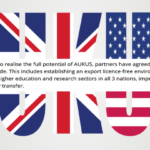AUKUS May Not Guarantee Any Subs, But It Does Ensure US Jurisdictional Drift

ARPANSA, the government agency that protects Australians from radiation, last week signed off on a deal to store nuclear waste on Garden Island, off the south coast of Perth, closer to Rockingham. But locals shouldn’t concern themselves about it, as, according to the agency, it’s just low-level waste.
This low-level radioactive waste is to be produced by the US and UK nuclear-powered submarines that will soon be on permanent rotation.
Known as Submarine Rotational Force-West, this military presence will be based at HMAS Stirling, which is also located on Garden Island, from 2027 onwards.
The waste might also be that produced by Australian nuclear-powered submarines (SSN), if the eight involved in the AUKUS deal ever do come to fruition, as despite our government about to toss billions in their direction, they’re not a guaranteed return.
And as Greens Senator David Shoebridge pointed out last week, the “low-level nuclear waste” to be stored at Garden Island will also be comprised of intermediate-level waste, as this was ascertained via questions put to the Australian Submarine Agency during June Senate estimates.
Indeed, nuclear-propelled submarines also produce high-level radioactive waste, but there’s nothing to worry about there, as ARPANSA didn’t mention that in its press release either.
Although the Albanese government has been searching around for a nuclear waste dump, where this high-level radioactive waste can be buried beneath unceded First Nations land, without free, prior and informed consent, and it remains highly potent for about 100,000 years.
So, for those tuning in for the first time, welcome to the new Australia: a nation where so vast and swift is its militarisation taking place since AUKUS was announced in September 2021, that nuclear waste storage, especially permanent dumps on First Peoples land, doesn’t even make the headlines.
Albanese’s moment in the sun
Former PM Scott Morrison launched the AUKUS pact with the US and the UK in mid-2021. Australia was said to be lucky enough to be the first nation the US is going to share its nuclear propulsion technology with besides the UK, and this would eventuate in eight nuke-powered submarines.
Morrison waxed lyrical about the need for this new security alliance between the US, the UK and Australia, due to the “security challenges in the Indo Pacific region”, which was unencrypted code for China, as Beijing is now challenging US economic hegemony, so Washington wants to war on it.
But when Labor then took office in 2022, Gough would have turned in his grave, as new prime minister Anthony Albanese embraced AUKUS with such gusto that it was difficult to recognise the once hard left Labor member, who was then revealed to be a sycophantic imperialist.
The AUKUS optimal pathway was announced in San Diego on 13 May 2023, which was when Albanese dropped the $368 billion price tag upon the Australian public, which is to pay that over the coming decades to acquire subs, which we can never own due to the content of their reactors.
And as part of the announcement, the details of the US-UK Submarine Rotational Force-West were also divulged, in the White House Briefing Note, right before it dealt with the three US Virginia-class submarines to be sold to us, which will then be followed by five UK and Australian built AUKUS SSN.
Those mugs down under
So, considering the optimal pathway is all about buildup to war on Beijing, SRF-West will likely be a permanent US base from which it can target China.
And with the passing of the US national defence bill for 2024 late last year, the groundwork was set for the transfer of three US Virginia class submarines to Australia and it further established our nation as a US domestic military source for critical minerals, such as lithium.
But the clincher came when the Pentagon released its 2025 fiscal year budget in March this year, as it only sets aside funding to build one Virigina sub next year, which effects the AUKUS deal, as the US had promised to lift production from around 1.3 boats a year to 2.3 in order to meet our needs.
The Pentagon has a goal of 66 Virginia class submarines, which means at present it needs to build 17, as well as one extra, by 2032 in order to honour this deal with Australia. And if it comes to the point that the US has not satisfied its own needs, then our nation simply lucks out.
Yet, despite this potential shortfall, the US Department of Defence is about to accept contributions from Australia to support submarine security activities under AUKUS to the tune of US$3 billion. Our nation’s first contribution is $2 billion in 2025 and will continue as an annual $100 million until 2033.
So, if the US doesn’t pick up its submarine building pace over the next decade, the president at the time will be able to apologise for not delivering on the deal, but they can thank us for the nonrefundable contribution, and this is all set out in Washington’s AUKUS facilitating legislation.
And from the position of the US, this is all rather ideal, as it’s establishing a forward positioned submarine base aimed at China and it’s sending over 700 US military personnel and their families to live in WA to run the base and whether we ever acquire our own subs isn’t really its concern.
AUKUS isolationism
Defence minister Richard Marles launched the 2024 National Defence Strategy in April, which is all about taking “a coordinated, whole-of-government and whole-of-nation approach” to defence. And to put taxpayer money where his mouth is, we’re now investing a further $50 billion in the military.
So, forget about cost-of-living or housing crises, as, according to the Coalition-inspired new Labor government, top-down militarisation is what our country needs, as the US is losing grip on its undisputed economic hegemony, so we must assist it in knocking out our greatest trading partner.
And in aid of taking a more isolationist stance, just like former US president Donald Trump used to spruik, Marles recently oversaw the passing of both the Defence Amendment (Safeguarding Australia’s Military Secrets) Bill 2024 and the Defence Trade Controls Amendment Bill 2024.
Passed in March, the Safeguarding Australia’s Military Secrets laws ensure that foreign work restricted individuals, or those who used to work for Defence, are barred from working for a military organisation or government body or even a designated foreign country, without authorisation.
This bill further prevents former defence personal from providing training to others. And it’s created two new offences, one for a foreign work restricted individual carrying out such unauthorised work and another criminalising regular Australians for same. And both these crimes carry 20 years inside.
While the Defence Trade Controls amendments pertain to military and dual-use goods and technology listed on the Defence and Strategic Goods List 2021, which contains items used in warfare, along with those that have commercial as well as military use.
Three new defence trade criminal offences have been created by the defence trade control reforms, which involve divulging DSGL technology in Australia to a foreign person, supplying DSGL goods and technology from outside of Australia, as well as the provision of DSGL services outside of Australia.
And all of these offences can see a person sent away for 10 years and/or fined $825,000.
So, these new laws further serve to integrate us into the select AUKUS sphere and have been necessitated to assist in guarding US classified information, as Australia not only becomes ever more integrated militarily with the US, but that nation also further enhances its jurisdictional force over us.







